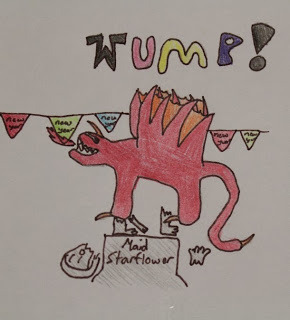VEILED ROSE Read-Along: Chapter 3, Part Three
 Unless you're new, you know the ropes. But in case you are new and you're wondering how to get your name entered in the weekly giveaways for this read-along, do take a moment to read the November 30 post, which explains the rules. They're pretty straight-forward. And we're getting to the end of our third week, and a third winner of Veiled Rose is about to be picked. Might it be you?
Unless you're new, you know the ropes. But in case you are new and you're wondering how to get your name entered in the weekly giveaways for this read-along, do take a moment to read the November 30 post, which explains the rules. They're pretty straight-forward. And we're getting to the end of our third week, and a third winner of Veiled Rose is about to be picked. Might it be you?Anyway, the Dragon has arrived, and we have a chapter to read . . .
PART THREEChapter 3
The destroyed fountain: There’s something symbolic about the Dragon destroying the Starflower Fountain upon his first arrival. It was such a symbol of strength against evil, of virtue triumphing of a terrible foe. And it’s burned, demolished, melted and broken beyond recall beneath the Dragon’s wrath.
A sign of terrible things to come.
She believed she looked upon her death: Queen Starflower, seeing the Dragon through her window, is immediately overcome with despair. Brave and strong though she has always been, all hope flees from her heart, and she knows that her end has come. She may go on living for a little while, but to what purpose?
It is most surprising and horrifying to see the queen’s reaction to the Dragon, I think. Of all people in the Eldest’s House, you expect her to try to be courageous, to organize and to influence. Every time we have met her in the book up until now, she has been in a position of strength, impressing us with her poise and power.
So seeing her immediately crumble fills us with more dread than if we first saw the Dragon from any other perspective. If Queen Starflower has given up within moments, what hope can there be?
Foxbrush: By contrast, Foxbrush joins with the other young men of the court. He’s crushed to the back of the crowd, the text tells us, but he still is part of their number as they hasten toward the great front door. His first impulse, however futile, is to fight. Again, not what you’d expect from this character.
The king: Hawkeye seems to have a better idea about the nature of dragons than others in the room. Or at least the nature of thisDragon. He tries to warn the young men against the fumes, the poison of the Dragon’s breath. Not soon enough, however.
Poison breath has been classic hallmark of dragons for much of literary history. Fafnir (the Old Norse and Icelandic dragon whose story influenced both Tolkien and C.S. Lewis in their own dragon creations) was possessed of poisonous breath as deadly as his fire. It’s not a feature you see among the friendlier dragons popular in modern fantasies . . . but I enjoyed bringing it back into play with my very-not-friendly dragons in this series. Or this Dragon, at least (since I don’t believe any of his “children” demonstrate such poisonous breath).
“Made myself incarnate.” According to the Dragon’s speech, taking incarnate form is not a normal choice for him. He does not like the mortal world, and he does not care to take shape that fits into its confines. But, determined to claim the “princess,” he has taken on a solid body and stepped into the Near World of mortals, however grudgingly.
This helps to explain why, later on, he is so angry at the time spent searching for the Beloved of his Enemy. He is a timeless creature that does not worry about the flow of years, hours, or minutes. And yet he is so furious to have spent so much time searching for the correct princess! It’s the incarnate body that is the problem, I believe. He hates being trapped inside of time, which is so confining to a being such as he.
Readers of Heartless may find this scene particularly interesting, since we have learned bits of it in the previous book via Lionheart’s account. But he did not tell all, for he did not know or understand all. He told then only of his charge against the Dragon, a futile charge that left him broken and gasping beneath the Dragon’s might. And he spoke of the Dragon choosing to spare him for some purpose he did not then know.
And he said in that version that a friend pulled him to safety. But he implied in that telling that the friend was Lady Daylily. Perhaps he was not aware of the truth. Perhaps he was not aware of courageous Rose Red throwing herself between him and that monster of her own Dreams.
How dare he be real? I love Rose Red’s reaction to the Dragon in this scene. She has told herself for years that, vicious though he is, he is still nothing but a nightmarish fancy invented of her own lonely mind. And now, to find out that he is real? And here, and present, and full of destruction! It should not be allowed. How dare he?
And yet, somehow, I don’t think Rose Red is as scared of the Dragon now as she was when she thought he was in her own mind. I think she realizes (even if only unconsciously) that she is now free from the fear that she is mad. And in that knowledge, she can be more courageous than ever.
Really, have there been many heroines more courageous than our Rose Red is in this moment?
“I won’t let you hurt him,” she said.
“And how will you stop me?” the Dragon demanded with a laugh.“I don’t know,” she said. “But I will.” (p. 194) Does she truly have the strength to battle such an enormous foe? Well, we have the rest of this book to find out . . . Questions on the text: 1. When the Dragon says, “I must give you up. Perhaps I should eat you instead?” it appears to be a contradiction. How can he both give Lionheart up and eat him? What do you think the answer to this question is? 2. Can you remember any other famous poisonous dragons?
3. Any favorite lines?
Q&A . . . Check back later today! I'm going to try to answer all of yesterday's questions sometime this morning. If not, I'll get them up tomorrow, I promise! :)
Fan Art: Jemma offers her depiction of the Dragon's arrival in Southlands!

Published on December 21, 2013 03:00
No comments have been added yet.



